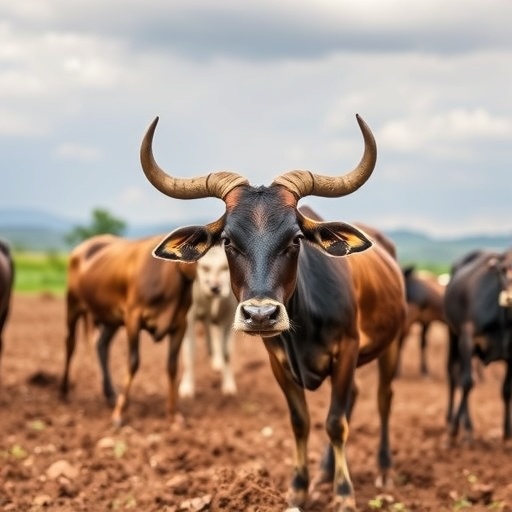In the intricate web of global climate dynamics, livestock farming emerges as a significant contributor to greenhouse gas emissions, with enteric methane being one of the most potent culprits. Methane emissions from ruminant digestion alone account for an astonishing portion of total global warming potential. It is against this backdrop that a pioneering study by Antwi et al., published in Discover Sustainability, explores innovative communication strategies aimed at reducing enteric methane emissions in African livestock farming systems. The authors offer a comprehensive assessment of the socio-economic, environmental, and cultural contexts shaping methane emissions and propose solutions that are both practical and sustainable.
Antwi and colleagues emphasize the urgent need for targeted communication strategies that resonate with local farmers. The complexities of agricultural practices in Africa require tailored approaches that consider the unique challenges faced in each region. Understanding the social dynamics and cultural beliefs surrounding livestock farming is essential for effective communication. The researchers argue that any initiative designed to reduce methane emissions must incorporate local knowledge and practices to achieve meaningful engagement with farmers.
The study identifies critical gaps in existing communication approaches, noting that conventional methods often fail to capture the interest of farmers. Farmers in rural areas may be skeptical of scientific findings presented without context. Consequently, the authors advocate for a narrative that connects the reduction of methane emissions to farmers’ everyday experiences—enhancing livestock health, improving productivity, and ultimately raising their income. By weaving climate action into the fabric of farmers’ livelihoods, the researchers believe that motivation to adopt methane-reducing practices will increase.
In exploring successful examples from different regions, the authors highlight the power of community-driven initiatives. Collaborative projects that unite farmers, agricultural extension workers, and local authorities have demonstrated positive outcomes in methane reduction. These grassroots efforts create a sense of ownership among stakeholders, fostering a collective resolve to address environmental challenges. Antwi et al. stress that harnessing local networks empowers communities and promotes sustainable agricultural practices.
The authors also delve into the significance of knowledge transfer in enhancing farmers’ understanding of methane emissions. Educational campaigns should prioritize easy-to-digest information that explains methane production in straightforward terms. Visual aids, storytelling, and practical demonstrations can play crucial roles in dispelling misconceptions and encouraging behavioral change. The researchers emphasize that when farmers comprehend the mechanics of methane emissions, they are more likely to adopt strategies that mitigate it.
Innovative technologies can further bolster these communication strategies. The integration of mobile applications and digital platforms provides opportunities for real-time information sharing among farmers. These technologies can be leveraged to disseminate best practices, update farmers on market trends, and facilitate discussions on climate-smart agriculture. By embracing technological advancements, the agricultural sector can create more effective channels for communication and education.
Economic incentives are another critical component of the strategy proposed by Antwi et al. The authors argue that financial considerations play a substantial role in farmers’ willingness to implement methane reduction techniques. Subsidies or compensation for adopting climate-friendly practices could motivate farmers to transition away from traditional practices. This economic rationale aligns environmental sustainability with the pursuit of profit, making climate action more appealing.
Policymakers are urged to join the conversation about methane reduction by crafting supportive policies that foster sustainable farming. Antwi et al. suggest that national and regional governments should create frameworks that incentivize emissions reduction while ensuring that farmers have access to necessary resources and training. Engaging policymakers early in the process ensures that community voices are heard, and policies reflect the realities of local agriculture.
Additionally, the researchers call for enhanced collaboration between government agencies, NGOs, and educational institutions to bolster outreach efforts. Building partnerships fosters a multifaceted approach to methane reduction that blends scientific knowledge with local practices. By aligning resources, stakeholders can amplify their impact and ensure broader outreach to farmers across diverse regions.
The implications of this research extend beyond the confines of African livestock farming. The strategies proposed by Antwi et al. contribute to the wider discourse on climate change and the agricultural sector. As the world grapples with the urgent need to reduce greenhouse gas emissions, the insights gleaned from Africa’s context can influence global strategies for sustainable agriculture.
In conclusion, Antwi and his team have illuminated a path forward for enteric methane reduction in African livestock systems through innovative communication and outreach strategies. Their research underscores the importance of localized, culturally sensitive approaches that prioritize the agency and understanding of farmers. By fostering collaboration, leveraging technology, and creating economic incentives, it is possible to address one of climate change’s most pressing contributors. The collective actions inspired by their findings may serve as a model for other regions grappling with similar challenges, igniting a movement towards more sustainable livestock farming practices globally.
Subject of Research: Communication strategies for enteric methane reduction in African livestock farming systems.
Article Title: Communication strategies for enteric methane reduction in African livestock farming systems.
Article References: Antwi, W., Iddrisu, F.T., Ansah, P.O. et al. Communication strategies for enteric methane reduction in African livestock farming systems. Discover Sustain 6, 1249 (2025). https://doi.org/10.1007/s43621-025-02154-0
Image Credits: AI Generated
DOI: https://doi.org/10.1007/s43621-025-02154-0
Keywords: livestock, methane emissions, communication strategies, sustainable agriculture, climate change, Africa.




